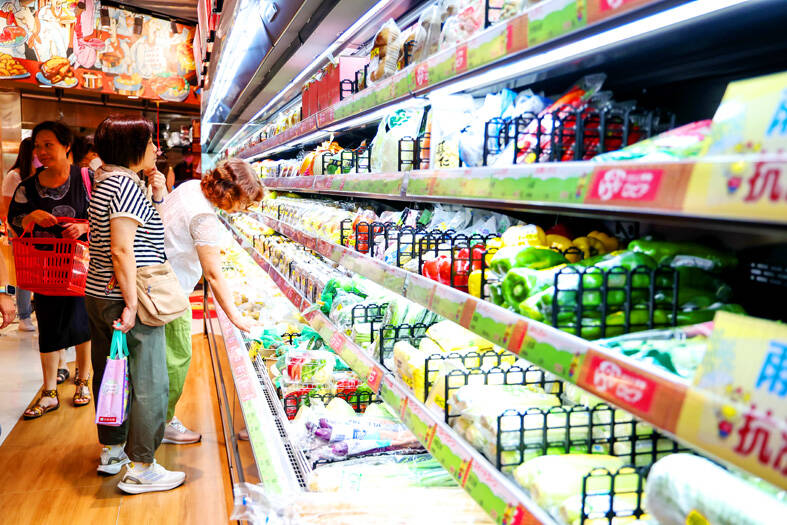Taiwan’s consumer price growth last month slowed to its weakest pace in more than four years, providing further evidence that inflationary pressures are easing and allowing room for monetary policy flexibility.
The consumer price index (CPI) rose 1.37 percent from a year earlier, representing the smallest year-on-year increase since May 2020 and staying below the central bank’s 2 percent target for the second consecutive month, the Directorate-General of Budget, Accounting and Statistics (DGBAS) said.
The slowdown was due to stable weather, which tempered gains in fruit prices, and a high base effect from June last year, when the Dragon Boat Festival drove up food and service costs, the statistics agency said.

Photo: CNA
“Price levels are broadly stable,” DGBAS official Tsao Chih-hung (曹志弘) said, adding that while inflation could edge higher this month due to seasonal factors, it is likely to remain under 2 percent through the second half of the year.
Core CPI, a more reliable long-term price tracker because it excludes volatile food and energy components, rose 1.47 percent, remaining below the 2 percent mark for the 15th straight month, Tsao said.
The subdued inflation reading eases pressure on the central bank to hold onto a tight monetary policy stance and might allow it to maintain current interest rates to support GDP growth amid external uncertainties.
Among the seven major categories, food prices posted the highest annual gain of 2.82 percent, led by an 8.56 percent surge in fruit prices, the agency said.
Meat prices and the cost of dining out rose 4.54 percent and 3.44 percent respectively, but egg prices fell 8.5 percent, softening the overall impact.
Prices for miscellaneous goods rose 2.21 percent, driven by jewelry, tobacco and betel nut prices, it said.
Healthcare inflation stood at 1.89 percent amid higher registration and ward fees, the agency said.
Housing costs increased 1.76 percent mainly on rent and household service charges, it said.
In contrast, transportation and communications costs fell 1.36 percent, as global oil price weakness pushed fuel prices down 8.16 percent, the DGBAS said, adding that airfares slid 5.89 percent, while auto repair costs rose 2.73 percent.
Meanwhile, the producer price index (PPI), a measure of the price movements of goods from a seller’s perspective, last month fell 5.47 percent, widening from a revised 4.34 percent drop in May.
The retreat reflected prevalent declines in global commodity prices, including oil, chemicals, metals and electronics, and the local currency’s rapid advance against the greenback, the DGBAS said.
For the first six months of this year, CPI increased 1.93 percent, while PPI edged up 0.27 percent from the same period last year, it said.

NEW IDENTITY: Known for its software, India has expanded into hardware, with its semiconductor industry growing from US$38bn in 2023 to US$45bn to US$50bn India on Saturday inaugurated its first semiconductor assembly and test facility, a milestone in the government’s push to reduce dependence on foreign chipmakers and stake a claim in a sector dominated by China. Indian Prime Minister Narendra Modi opened US firm Micron Technology Inc’s semiconductor assembly, test and packaging unit in his home state of Gujarat, hailing the “dawn of a new era” for India’s technology ambitions. “When young Indians look back in the future, they will see this decade as the turning point in our tech future,” Modi told the event, which was broadcast on his YouTube channel. The plant would convert

‘SEISMIC SHIFT’: The researcher forecast there would be about 1.1 billion mobile shipments this year, down from 1.26 billion the prior year and erasing years of gains The global smartphone market is expected to contract 12.9 percent this year due to the unprecedented memorychip shortage, marking “a crisis like no other,” researcher International Data Corp (IDC) said. The new forecast, a dramatic revision down from earlier estimates, gives the latest accounting of the ongoing memory crunch that is affecting every corner of the electronics industry. The demand for advanced memory to power artificial intelligence (AI) tasks has drained global supply until well into next year and jeopardizes the business model of many smartphone makers. IDC forecast about 1.1 billion mobile shipments this year, down from 1.26 billion the prior

People stand in a Pokemon store in Tokyo on Thursday. One of the world highest-grossing franchises is celebrated its 30th anniversary yesterday.

Zimbabwe’s ban on raw lithium exports is forcing Chinese miners to rethink their strategy, speeding up plans to process the metal locally instead of shipping it to China’s vast rechargeable battery industry. The country is Africa’s largest lithium producer and has one of the world’s largest reserves, according to the US Geological Survey (USGS). Zimbabwe already banned the export of lithium ore in 2022 and last year announced it would halt exports of lithium concentrates from January next year. However, on Wednesday it imposed the ban with immediate effect, leaving unclear what the lithium mining sector would do in the